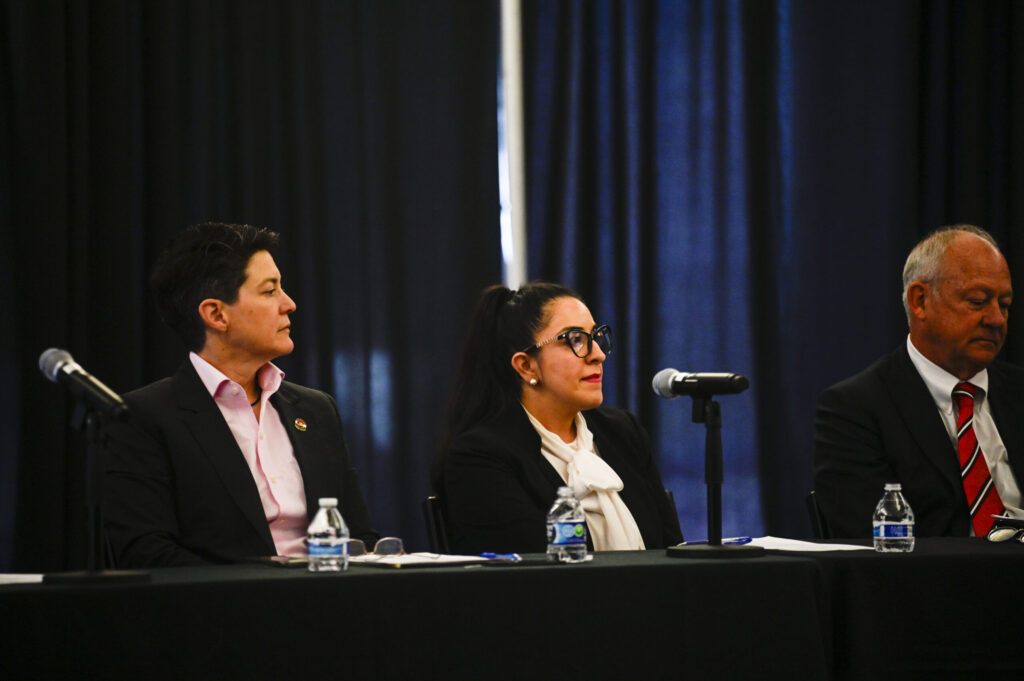‘Dabs made me do it?’ Colorado justices ponder when defendants can rely on laced drugs as defense
Members of the Colorado Supreme Court struggled last week to determine where to draw the line between allowing defendants to argue they unwittingly consumed a substance that caused them to engage in criminal behavior, while also preventing a wave of unsubstantiated claims about laced drugs.
Under state law, “involuntary intoxication” is an affirmative defense, meaning the prosecution has to disprove some component of that defense for the jury to reach a guilty verdict. The defense reflects the principle that a person under the influence of drugs is not criminally liable for his conduct unless he “knowingly” introduces substances into his body that he “knows or ought to know have the tendency to cause intoxication.”
But what if there is evidence a defendant ingested one drug, and his extreme reaction suggests it was actually laced with something else? Does it matter that the substance he thought he was taking was not the one behind the criminal conduct?
“Naturally, the concern is what happens with someone who legally drinks an alcoholic beverage that turns out to be spiked with something that causes them to have a psychotic episode,” said Justice William W. Hood III during the May 13 oral arguments.
Under the government’s argument, Hood continued, he could consume a gummy he thought contained a low dose of THC. But if it actually had a much higher dose and he committed a crime while unexpectedly under the influence, “that’s on me because I’ve taken an intoxicant and I’ve decided to roll the dice, essentially.”
“Yes, it is a strict rule and I recognize it’s a strict rule,” responded Assistant Attorney General Jaycey DeHoyos.
A Denver jury convicted Isaac U. Mion of robbery, criminal mischief and menacing after he acted aggressively toward two security guards and threatened a motorist. Although there was clear evidence he committed the offenses, Mion claimed he was involuntarily intoxicated at the time. Specifically, he testified a friend shared a marijuana joint with him, but it must have contained an illicit substance because it caused Mion to have a far different reaction than normal.
No other case in Colorado had addressed whether a defendant could claim involuntary intoxication when he acknowledges ingesting an intoxicating substance but is unaware of the presence of a second substance. Mion’s trial judge declined to instruct the jury they could find Mion was involuntarily intoxicated, noting there was “no evidence that it was anything other than marijuana” that Mion smoked.
However, a three-judge panel for the Court of Appeals concluded the defense of involuntary intoxication can apply in situations akin to consuming an alcoholic drink secretly laced with a “date rape” drug. It was not enough that a defendant knew they were ingesting an intoxicating substance, but the question was whether they were aware of the particular substance that would trigger the reaction.
“To rule otherwise would mean that anytime a person knowingly ingests an intoxicant — no matter how mild — the person will be criminally responsible for any resulting behavior, even if what was ingested contained, unbeknownst to the defendant, a different intoxicant,” wrote Judge Craig R. Welling.
Because Mion’s testimony, combined with responding officers’ observations, provided some evidence he took more than marijuana, the appellate panel ordered a new trial so jurors could consider his involuntary intoxication defense.
The government appealed to the Supreme Court, arguing the Court of Appeals did not only capture intoxication by “innocent mistake,” but made it harder to convict someone who, like Mion, purposefully took a drug without knowing much about its contents.
“You’re saying, ‘You ingest a substance, you’re stuck with whatever’s in that substance,'” observed Justice Brian D. Boatright.
“The assumption of risk, when you’re talking about a great many street drugs, seems fair from a policy perspective,” added Hood. “But in other instances where you’re drinking an alcoholic beverage that you think is just a regular cocktail, and then it turns out — or you’re consuming marijuana from a dispensary and you have ample reason to think there’s no problem with it — and for some reason it turns out to be laced with something —”
DeHoyos quickly clarified that she envisioned such defendants to be able to claim their intoxication was the product of criminal behavior, as the crime of second-degree assault could encompass spiking a person’s drink.
Joseph Chase, the attorney for Mion, argued it was a low threshold to allow a defendant to argue they were involuntarily intoxicated. If a defendant knows synthetic marijuana or concentrated marijuana — known as dabs — could trigger a certain reaction, Chase contended that could be evidence of involuntary intoxication.
“‘Dabs made me do it’ becomes the defense in a great many more cases, right?” wondered Hood.
Not necessarily, responded Chase, pointing to a recent Court of Appeals decision finding a defendant’s claim that his cocaine “didn’t taste right” fell short of the evidence needed to claim involuntary intoxication.
If the law is ambiguous, said Hood, “and we’re making a policy choice, why, in terms of trying to do what’s best for society as a whole, wouldn’t it be best to say, ‘If you take street drugs, it’s on you?'”
“If you are mistaken about the character of what you are ingesting, it is an innocent mistake,” said Chase. “I think that it’s important to craft this test to make sure that we do capture these scenarios where there is some mistake.”
The case is People v. Mion.














